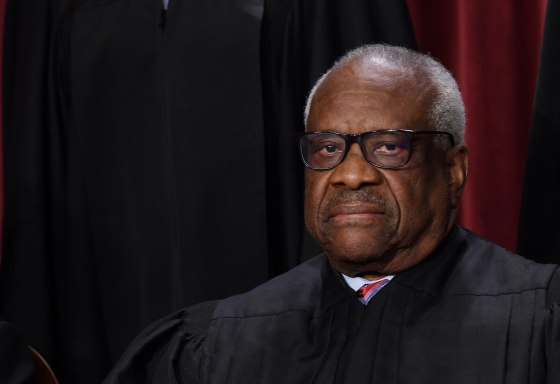
A request by two Democratic lawmakers to refer Supreme Court Justice Clarence Thomas to the Justice Department regarding free travel and gifts from wealthy benefactors that were mostly left out of his financial disclosure forms was denied by a judicial body that establishes national policy for federal courts.
The group, the Judicial Conference, sent identical letters Thursday to Sen. Sheldon Whitehouse, D-R.I., who chairs the Judiciary subcommittee on federal courts, and Rep. Hank Johnson, D-Ga., the ranking member of the Judiciary subcommittee on courts, who asked it in 2023 to refer Thomas to the attorney general for investigation following aProPublica report onfree travel and gifts to Thomas by billionaire Harlan Crow and others.
Robert J. Conrad Jr., secretary of the Judicial Conference, stated that Thomas had submitted revised financial disclosures “that address several issues identified in your letter” and contended that the Judicial Conference’s jurisdiction to refer complaints regarding justices of the Supreme Court is legally ambiguous.
“One would expect Congress to at least explicitly announce any such instruction because the Judicial Conference does not oversee the Supreme Court and any attempt to give the Conference such responsibility would raise severe constitutional problems. However, this clause makes no mention of such an explicit mandate,” Conrad stated.
He turned down a similar request on Thursday from Russ Vought, President of Citizens for Renewing America and President-elect Donald Trump’s choice to head the Office of Management and Budget. Vought had filed an ethics complaint against Justice Ketanji Brown Jackson, claiming that she had concealed information about her husband’s medical malpractice consulting income.
Conrad said that both justices had amended their financial disclosures and that they have agreed to follow guidance issued to other federal judges.
“In the end, Conrad’s response doesn’t address the only real question the Judicial Conference should have been focused on for the nearly two years it spent on this matter: Is there reasonable cause to believe that Justice Thomas willfully broke the disclosure law?” said Whitehouse in a statement criticizing Conrad’s response.
“It appears that the judiciary is neglecting its legal obligation to hold a justice of the Supreme Court responsible for ethical transgressions,” Whitehouse continued.
Johnson criticized the Judicial Conference, saying in a statement Friday that the letter “in effect exempts Supreme Court justices from the financial reporting requirements that all other federal court judges are bound by law to follow.”
Additionally, he advocated for the Supreme Court Ethics, Recusal and Transparency Act to be passed, claiming that it would include an enforcement mechanism and hold justices to the same standards as judges in lower courts. Last year, Senate Republicans blocked the plan.
Elliot S. Berke, an attorney for Thomas, has said his client “has fully complied with the new disclosure requirement” after guidance issued in 2023 specified that a reporting exemption for personal hospitality gifts did not apply to gifts of transportation and at commercial properties.
Rachel Cauley, a spokesperson for Citizens for Renewing America, a conservative social welfare group, argued after the Judicial Conference’s response that liberal justices are “not following” the ethics disclosure rules. In her announcement, she emphasized the work her group has been doing to raise awareness of the problem, stating that “a think tank needs to file a complaint to get it covered and affect change.”
Whitehouse and Senate Finance Committee Chairman Ron Wyden, D-Ore., made a direct plea tothe Justice Departmentin July to criminally investigate whether Thomas violated federal ethics and tax laws. No such inquiries have been made public.
The Supreme Courtformally adopteda new ethics code in 2023, but more than a year later questions have lingered over its enforcement.
Note: Every piece of content is rigorously reviewed by our team of experienced writers and editors to ensure its accuracy. Our writers use credible sources and adhere to strict fact-checking protocols to verify all claims and data before publication. If an error is identified, we promptly correct it and strive for transparency in all updates, feel free to reach out to us via email. We appreciate your trust and support!
